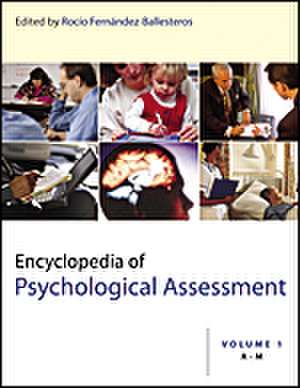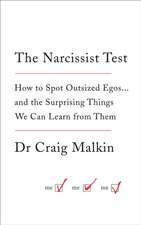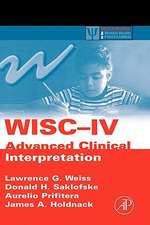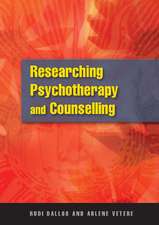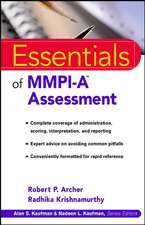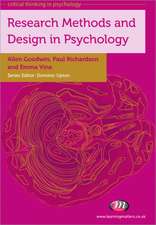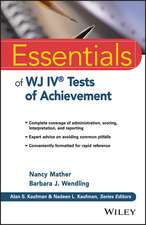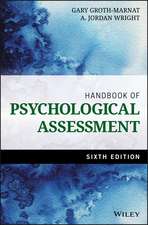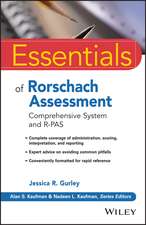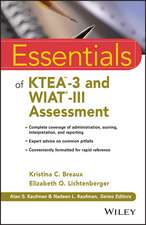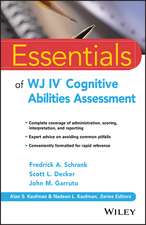Encyclopedia of Psychological Assessment
Editat de Rocio Fernandez-Ballesterosen Limba Engleză Hardback – 19 dec 2002
The Encyclopedia of Psychological Assessment is a landmark reference work and constitutes a definitive resource for academics, practitioners and students working in any field of applied psychological science.
Psychological assessment is a key component of psychological work. Devices of scientific assessment are necessary for adequate describing, diagnosis, predicting, explaining or changing the behaviour of all subjects under examination. This double-volume collection offers complete coverage to facilitate action in each of these areas and will consequently be invaluable to psychologists in any applied setting.
The two volumes of the Encyclopedia of Psychological Assessment contain a series of 235 entries, organized alphabetically, and covering a variety of fields. Each entry includes a general conceptual and methodological overview, a section on relevant assessment devices, followed by links to related concepts in the Encyclopedia and a list of references.
The Encyclopedia of Psychological Assessment provides:
- A comprehensive network for psychological assessment as a conceptual and methodological discipline, and as a professional activity
- An overview of the complexity of assessment, which involves not only testing, but also a process of decision-making for answering relevant questions that arise in the different applied fields
- A presentation of relevant issues from basic theory (theoretical perspectives, ethics) and methodology (validity, reliability, item response theory) to technology and modes of assessment (tests, instruments and equipment for measuring behavioral operations)
- An attempt to unify this diverse field by offering full coverage of all areas from the most traditional, such as clinical, educational and work and organizational psychology, to the most recent applications linked to health, gerontology, neuropsychology, psychophysiology and environmental assessment.
The Encyclopedia of Psychological Assessment offers a truly international perspective, both in terms of the selected authors and chosen entries. It aims to provide an integrated view of assessment, bringing together knowledge dispersed throughout several methodological and applied fields, but united in terms of its relevance for assessment. It is an essential purchase for any library with an existing collection or concern with the field of psychological science in general.
Preț: 3017.76 lei
Preț vechi: 4078.06 lei
-26% Nou
Puncte Express: 4527
Preț estimativ în valută:
577.44€ • 629.21$ • 486.58£
577.44€ • 629.21$ • 486.58£
Carte tipărită la comandă
Livrare economică 23 aprilie-07 mai
Preluare comenzi: 021 569.72.76
Specificații
ISBN-13: 9780761954941
ISBN-10: 0761954945
Pagini: 1731
Dimensiuni: 189 x 246 x 78 mm
Greutate: 2.72 kg
Ediția:Two-Volume Set
Editura: SAGE Publications
Colecția Sage Publications Ltd
Locul publicării:London, United Kingdom
ISBN-10: 0761954945
Pagini: 1731
Dimensiuni: 189 x 246 x 78 mm
Greutate: 2.72 kg
Ediția:Two-Volume Set
Editura: SAGE Publications
Colecția Sage Publications Ltd
Locul publicării:London, United Kingdom
Recenzii
“This unique work provides comprehensive treatment of the discipline of psychological assessment. . . . An impressive international group of scholars. Highly recommended.”
"The volumes expand our knowledge and understanding of the assessment involved in psychology."
"The volumes expand our knowledge and understanding of the assessment involved in psychology."
Cuprins
VOLUME ONE
Achievement Motivation - Uwe Kleinbeck
Achievement Testing - Anita M Hubley
Adaptive and Tailored Testing (Includes IRT and Non IRT Application) - Vicente Ponsoda and Julio Olea
Ambulatory Assessment - Jochen Fahrenberg
Analogue Methods - Richard E Heyman and Amy M Smith Slep
Anger, Hostility and Aggression Assessment - Manolete S Moscoso and Miguel Angel Pe[ac]rez-Nieto
Antisocial Disorders Assessment - Concetta Pastorelli and Maria Gerbino
Anxiety Assessment - Norman S Endler and Nancy L Kocovski
Anxiety Disorders Assessment - Juan Jos[ac]e Miguel Tobal and Hector Gonzalez Ord[ac]i
Applied Behavioural Analysis - Erik Arntzen
Applied Fields - Irving B Weiner
Clinical
Applied Fields - Filip Dochy
Education
Applied Fields - Marie Luise Kluck and Karl Westhoff
Forensic
Applied Fields - Hans-Werner Wahl and Ursula Lehr
Gerontology
Applied Fields - Britta Renner and Ralf Schwarzer
Health
Applied Fields - Carmen Armengol de la Miyar, Elizabeth J Moes and Edith Kaplan
Neuropsychology
Applied Fields - Jos[ac]e Mar[ac]ia Peir[ac]o & Vicente Mart[ac]inez-Tur
Organisations
Applied Fields - Graham Turpin
Psychophysiology
Applied Fields - Lutz F Hornke
Work and Industry
Assesment Process - Eric E J De Bruyn
Assessor's Bias - Friedrich L[um]oesel and Martin Schmucker
Attachment - Marinus Van Ijzendoorn and Marian J Bakermans-Kranenburg
Attention - Sara Friedman and Anita Konachoff
Attitudes - Icek Ajzen
Attribution Styles - Robert M Hessling, Craig A Anderson and Daniel W Russell
Autobiography - Torbj[um]orn Svensson and William Randall
Automated Test Assembly Systems - Wim van der Linden
Behavioural Assessment Techniques - William J Korotitsch and Rosemery O Nelson-Gray
Behavioural Settings and Behaviour Mapping - Robert B Bechtel
Big Five Model Assessment - Boele De Raad and Marco Perugini
Brain Activity Measurement - Rainer B[um]osel and Sascha Tamm
Burn Out Assessment - Christine Maslach
Career and Personnel Development - Peter Herriot
Caregiver Burden - Constan[ce]ca Pa[ac]ul and Ignacio Martin
Case Formulation - William H O'Brien, Allison Collins and Mary Kaplar
Centres (Assessment Centres) - Alvaro de Ansorena
Child and Adolescent Assessment in Clinical Settings - Mar[ac]ia Victoria del Barrio
Children Custody - Shlomo Romi and Nurit Levi
Children with Disabilities - Miguel Angel Verdugo
Classical and Modern Item Analysis - Ronald K Hambleton and Mohamed Dirir
Classical Test Theory - Jos[ac]e Mu[ti]niz
Classification (General, Including Diagnosis) - Hubert Feger
Clinical Judgement - Antonio Godoy
Coaching Candidates to Score Higher on Tests - Avi Allalouf
Cognitive Ability - Arthur R Jensen
g Factor
Cognitive Abilities - Roberto Colom
Multiple Cognitive Abilities
Cognitive Decline/Impairment - Christopher Hetzog and Simeon Feldstein
Cognitive Maps - Reginald G Colledge
Cognitive/Mental Abilities in Work and Organizational Settings - Edwin A Fleishman
Cognitive Plasticity - Reinhold Kliegl and Doris Philipp
Cognitive Processes - Patrick C Kyllonen and Richard Roberts
Current Status
Cognitive Processes - Philip L Ackerman
Historical Perspective
Cognitive Psychology and Assessment Practices - Mark Wilson
Cognitive Styles - Alessandro Antonietti
Communicative Language Abilities - Mar[ac]ia Forns
Computer-Based Testing - Walter D Way and Jerry Gorham
Copying Styles - Timo Suutama
Counselling, Assessment in - Greg J Neymeyer, Jocelyn Saferstein, and Jason Z Bowman
Couple Assessment in Clinical Settings - Douglas K Snyder
Creativity - Dean Keith Simonton
Criterion-Referenced Testing - Ronald K Hambleton
Methods and Procedures
Cross-Cultural Assessment - Ype H Poortinga
Dangerous/Violence Potential Behaviour - Carl B Gacono and Robert Bodholt
Decision (Including Decision Theory) - Manfred Amelang
Dementia - Suvarna Wagle, Ajay Waple and German E Berrios
Development (General) - Jan Ter Laak, G Brugman and M de Goede
Development - Jennifer M Gillis, James C Kaufman and Alan S Kaufman
Intelligence/Cognitive
Development - Mercedes Belinch[ac]on
Language
Development - Orli Yazdi-Ugav and Shlomo Romi
Psychomotor
Development - Mar[ac]ia Victoria del Barrio
Socio-Emotional
Diagnosis of Mental and Behavioural Disorders - Pierre Pichot
Diagnostic Testing in Educational Settings - Jacques Gregoire
Dynamic Assessment (Learning Potential Testing, Testing-the-Limits) - Carol S Lidz
Eating Disorders - Carmina Salda[ti]na
Emotional Intelligence - Jack D Mayer
Emotions - Jos[ac]e Miguel Fern[ac]andez-Dols and Jo Anne Bachorowski
Empowerment - Donata Francescato
Environmental Attitudes and Values - Riley Dunlap and Robert Emmet Jones
Equipment for Assessing Basic Processes - Rainer M B[um]osel
Ethics - Gerhard Blickle
Evaluability Assessment - Jos[ac]e Manuel Hern[ac]andez
Evaluation - Michael Scriven
Program Evaluation (General)
Evaluation in Higher Education - Salvador Chac[ac]on-Moscoso and Francisco Pablo Holgado Tello
Executive Functions Disorders - Jos[ac]e Le[ac]on-Carrion
Explanation - Hans Westmeyer
Factor Analysis - Barbara M Byrne
Confirmatory
Factor Analysis - Claudio Barbaranelli
Exploratory
Family - Theodore Jacob and Jon Randolph Haber
Field Survey - Juan D[ac]iez Medrano
Protocols Development
Fluid and Crystallized Intelligence - Andr[ac]e Beauducel
Formats for Assessment - April L Zenisky and Ronald K Hambleton
Generalizability Theory - Fabio Ferlazzo
Giftedness - H Lee Swanson
Goal Attainment Scaling (GAS) - Thomas J Kiresuk
Health - Abilio Reig-Ferrer and Antonio Cepeda-Benito
History of Psychological Assessment - Heliodoro Carpintero
Identity Disorders - Jane Kroger and Jan H Rosenvingen
Idiographic Methods - Daniel Cervone and William G Shadel
Instructional Strategies - Carmen Vizcarro Guarch
Intelligence Assessment (General) - James C Kaufman and Alan S Kaufman
Intelligence Assessment through Cohort and Time - Georg Rudinger and Christian Rietz
Interest - Rodney L Lowman
Interview - Mar[ac]ia Martina Casullo and Mar[ac]ia Oliva M[ac]arquez
Interview in Behavioural and Health Settings - Mar[ac]ia Xes[ac]us Froj[ac]an Parga
Interview in Child and Family Assessment - Anna Silvia Bombi
Interview in Work and Organizational Settings - Karl Westhoff
Irrational Beliefs - K Robert Bridges
Item Banking - Manfred Steffen and Martha Stocking
Item Bias - Bruno D Zumbo and Anita M Hubely
Item Response Theory - Ronald K Hambleton and Michael Jodoin
Models and Features
Job Characteristics - David Scheffer
Job stress - Gunter Debus and Maike Oppe
Landscapes and Natural Environments - Terry Hartig
Language (General) - Jos[ac]e Manuel Igoa & Mercedes Belinch[ac]on
Latent Class Analysis - J[um]urgen Rost
Leadership in Organisational Settings - Francisco Fern[ac]andez Ballesteros
Leadership Personality - Robert Hogan and Robert Tett
Learning Disabilities - H Lee Swanson
Learning Strategies - Carmen Vizacarro Guarch
Life Events - Elaine Wethington
Locus of Control - Christopher Peterson
VOLUME TWO
Memory (General) - Jos[ac]e Mar[ac]ia Ru[ac]iz Vargas
Memory Disorders - Lilianne Manning
Mental Retardation - Miguel Angel Verdugo
Mood Disorders - Elaine M Heiby, Velma A Kameoka and Judy H Lee
Motivation - Richard Koestner
Motor Skills in Work Settings - Will A C Spijkers
Multidimensional Item Response Theory - Cees A M Glas
Multidimensional Scaling Methods - Mark Davison
Multimodal Assessment (Including Triangulation) - Rolf-Dieter Stieglitz
Multitrait-Multimethod Matrices - Levent Dumenci
Needs Assessment - Salvador Chac[ac]on-Moscoso and [ac]Angel Lara-Ruiz and Jos[ac]e Antonio P[ac]erez-Gil
Neuropsychological Test Batteries - Andreas Kruse
Norm Referenced Testing - Anil Kanjee
Methods and Procedures
Objectivity - Hans Westmeyer
Observational Methods (General) - Mar[ac]ia Teresa Anguera Argilaga
Observational Techniques in Clinical Settings - Warren W Tryon
Observational Techniques in Work and Organisational Settings - Siegfried Greif
Organizational Culture - Christopher Peterson, Fiona Lee and Martin E P SeligmanAnnette Kulge
Optimism
Organizational Structure, Assessment of - James L Zazzali
Outcome Assessment/Treatment Assessment - Mark E Maruish
Outcome Evaluation in Neuropsychological Rehabilitation - Jos[ac]e Le[ac]on-Carri[ac]on
Palliative Care - Pilar Barreto
Perceived Environment Quality - Jos[ac]e Antonio Corraliza
Performance - Eva L Baker and Richard S Brown
Performance Standards - Barbara S Plake
Constructed Response Item Formats
Performance Standards - Gregory J Cizek
Selected Response Item Formats
Person/Situation (Environment) Assessment - Jens B Asendorpf
Personal Constructs - David A Winter
Personality Assessment (General) - Gian Vittorio Caprara and Daniel Cervone
Personality Assessment through Longitudinal Designs - Georg Rudinger and Christian Rietz
Personnel Selection, Assessment in - Kevin R Murphy and Zinta S Byrne
Physical Abilities in Work Settings - Edwin A Fleishman
Planning - Sarah L Friedman and Heather Biggar
Planning Classroom Tests - Giray Berberoglu
Post-Occupancy Evaluation of the Built Environment - Richard Wener
Practical Intelligence - Richard K Wagner
Conceptual Aspects
Practical Intellligence - Linda S Gottfredson
Its Measure
Prediction (General) - Hubert Feger
Prediction - Hans Westmeyer
Clinical versus Statistical
Pre-School Children - Robin L Phaneuf and Gary Stoner
Problem Solving - Martin Kersting
Projective Techniques - Danilo R. Silva
Prosocial Behaviour - Gian Vittorio Caprara
Psychoeducational Test Batteries - John M Hintze
Psychoneuroinmunology - Victor J Rubio
Psychophysiological Equipments and Measurements - Jaime Vila
Qualitative Methods - Greg J Neimeyer and Marco Gemignan
Quality of Life - Abilio Reig-Ferrer
Reliability - Dato N M de Gruijter
Report (General) - Gary Groth-Marnat
Reporting Test Results in Education - Howard Wainer
Residential and Treatment Facilities - Svein Friis and Torleif Ruud
Risk and Prevention in Work and Organizational Settings - Babette Fahlbruch
Self, The (General) - Alfredo Fierro
Self-Control - Elaine M Heiby, Peter G Mezo and Velma A Kameoka
Self-Efficacy - Albert Bandura
Self-observation (Self-Monitoring) - William J Korotitsch and Rosemery O Nelson-Gray
Self-Presentation Measurement - Delroy L Paulhus
Self-Report Distortions - Ruth A Baer, Jason C Rinaldo and David T R Berry
Self-Report Questionnaires - Leslie C Morey
Self-Reports (General) - Roc[ac]io Fern[ac]andez-Ballesteros and Mar[ac]ia Oliva M[ac]arquez
Self-Reports in Behavioural Clinical Settings - Mar[ac]ia Xes[ac]us Froj[ac]an Parga
Self-Reports in Work and Organizational Settings - Peter F Merenda
Sensation Seeking - Marvin Zuckerman
Social Climate - Rudolf H Moos and Charles J Holahan
Social Competence (Including Social Skills, Assertion) - Francisco Xavier M[ac]endez Carrillo and Jos[ac]e Olivares
Social Networks - Marc Pilisuk and Angela Wong
Social Resources - Benjamin H Gottlieb
Socio-Demographic Conditions - Juan D[ac]iez Nicol[ac]as
Sociometric Methods - Rosario Mart[ac]inez Arias
Standard for Educational and Psychological Testing - Daniel R Eignor
Stress - Hannelore Weber
Stressors - Nancy M Wells and Gary W Evans
Physical
Stressors - Toni C Antonucci and Jessica M McIlvane
Social
Subjective Methods - Guillem Feixas
Substance Abuse - Mar[ac]ia Jes[ac]us Froj[ac]an Parga
Temperament - Jan Strelau
Test Accommodations for Disabilities - Stan Scarpati
Test Adaptation/Translation Methods - Fons Van de Vijver
Test Anxiety - Moshe Zeidner and Gerald Mattheus
Test Designs - Patrick C Kyllonen
Developments
Test Directions and Scoring - Gerardo Prieto and Ana R Delgado
Test User Competence/Responsible Test Use - Lorraine Dittrich Eyde
Testing in the Second Language in Minorities - Juana G[ac]omez-Benito
Testing through the Internet - Dave Bartram
Theoretical Perspective - John D Cone
Behavioural
Theoretical Perspective - Cesare Cornoldi and Nicola Mammarella
Cognitive
Theoretical Perspective - Susan B Watson et al
Cognitive-Behavioural
Theoretical Perspective - Robert A Neimeyer and Heidi Levitt
Constructivist
Theoretical Perspective - Irving B Weiner
Psychoanalytic
Theoretical Perspective - Arthur W Staats
Psychological Behaviourism
Theoretical Perspective - Kurt Pawlik
Psychometric
Theoretical Perspective - G[um]unter Schiepek
Systemic
Thinking Disorders Assessment - James H Kleiger
Time Orientation - Phillip G Zimbardo and John N Boyd
Total Quality Management - Francisco Fern[ac]andez-Ballesteros
Trait-State Models - Rolf Steyer
Triarchic Intelligence Components - Robert J Sternberg
Type A - Jos[ac]e Berm[ac]udez
A Proposed Psychosocial Risk Factor for Cardio-Vascular Diseases
Type C - Lydia R Temoshok
A Proposed Psychosocial Risk Factor for Cancer
Unobtrusive Measures - Lee Sechrest and Rebecca J Hill
Utility - Katrin Borcherding
Validity (General) - Stephen G Sireci
Validity Construct - Wayne J Camara
Validity - Stephen G Sireci
Content
Validity - Stephen B Dunbar and Virginia L Ordman
Criterion-Related
Values - Piotr K Oles & Hubert J M Hermans
Visuo-Perceptual Impairments - Jos[ac]e Le[ac]on-Carri[ac]on
Voluntary Movement - Georg Goldengerg
Well-Being (Including Life Satisfaction) - William Pavot and Ed Diener
Wisdom - Ursula M Staudinger
Work Performance - Fred R H Zijstra
Achievement Motivation - Uwe Kleinbeck
Achievement Testing - Anita M Hubley
Adaptive and Tailored Testing (Includes IRT and Non IRT Application) - Vicente Ponsoda and Julio Olea
Ambulatory Assessment - Jochen Fahrenberg
Analogue Methods - Richard E Heyman and Amy M Smith Slep
Anger, Hostility and Aggression Assessment - Manolete S Moscoso and Miguel Angel Pe[ac]rez-Nieto
Antisocial Disorders Assessment - Concetta Pastorelli and Maria Gerbino
Anxiety Assessment - Norman S Endler and Nancy L Kocovski
Anxiety Disorders Assessment - Juan Jos[ac]e Miguel Tobal and Hector Gonzalez Ord[ac]i
Applied Behavioural Analysis - Erik Arntzen
Applied Fields - Irving B Weiner
Clinical
Applied Fields - Filip Dochy
Education
Applied Fields - Marie Luise Kluck and Karl Westhoff
Forensic
Applied Fields - Hans-Werner Wahl and Ursula Lehr
Gerontology
Applied Fields - Britta Renner and Ralf Schwarzer
Health
Applied Fields - Carmen Armengol de la Miyar, Elizabeth J Moes and Edith Kaplan
Neuropsychology
Applied Fields - Jos[ac]e Mar[ac]ia Peir[ac]o & Vicente Mart[ac]inez-Tur
Organisations
Applied Fields - Graham Turpin
Psychophysiology
Applied Fields - Lutz F Hornke
Work and Industry
Assesment Process - Eric E J De Bruyn
Assessor's Bias - Friedrich L[um]oesel and Martin Schmucker
Attachment - Marinus Van Ijzendoorn and Marian J Bakermans-Kranenburg
Attention - Sara Friedman and Anita Konachoff
Attitudes - Icek Ajzen
Attribution Styles - Robert M Hessling, Craig A Anderson and Daniel W Russell
Autobiography - Torbj[um]orn Svensson and William Randall
Automated Test Assembly Systems - Wim van der Linden
Behavioural Assessment Techniques - William J Korotitsch and Rosemery O Nelson-Gray
Behavioural Settings and Behaviour Mapping - Robert B Bechtel
Big Five Model Assessment - Boele De Raad and Marco Perugini
Brain Activity Measurement - Rainer B[um]osel and Sascha Tamm
Burn Out Assessment - Christine Maslach
Career and Personnel Development - Peter Herriot
Caregiver Burden - Constan[ce]ca Pa[ac]ul and Ignacio Martin
Case Formulation - William H O'Brien, Allison Collins and Mary Kaplar
Centres (Assessment Centres) - Alvaro de Ansorena
Child and Adolescent Assessment in Clinical Settings - Mar[ac]ia Victoria del Barrio
Children Custody - Shlomo Romi and Nurit Levi
Children with Disabilities - Miguel Angel Verdugo
Classical and Modern Item Analysis - Ronald K Hambleton and Mohamed Dirir
Classical Test Theory - Jos[ac]e Mu[ti]niz
Classification (General, Including Diagnosis) - Hubert Feger
Clinical Judgement - Antonio Godoy
Coaching Candidates to Score Higher on Tests - Avi Allalouf
Cognitive Ability - Arthur R Jensen
g Factor
Cognitive Abilities - Roberto Colom
Multiple Cognitive Abilities
Cognitive Decline/Impairment - Christopher Hetzog and Simeon Feldstein
Cognitive Maps - Reginald G Colledge
Cognitive/Mental Abilities in Work and Organizational Settings - Edwin A Fleishman
Cognitive Plasticity - Reinhold Kliegl and Doris Philipp
Cognitive Processes - Patrick C Kyllonen and Richard Roberts
Current Status
Cognitive Processes - Philip L Ackerman
Historical Perspective
Cognitive Psychology and Assessment Practices - Mark Wilson
Cognitive Styles - Alessandro Antonietti
Communicative Language Abilities - Mar[ac]ia Forns
Computer-Based Testing - Walter D Way and Jerry Gorham
Copying Styles - Timo Suutama
Counselling, Assessment in - Greg J Neymeyer, Jocelyn Saferstein, and Jason Z Bowman
Couple Assessment in Clinical Settings - Douglas K Snyder
Creativity - Dean Keith Simonton
Criterion-Referenced Testing - Ronald K Hambleton
Methods and Procedures
Cross-Cultural Assessment - Ype H Poortinga
Dangerous/Violence Potential Behaviour - Carl B Gacono and Robert Bodholt
Decision (Including Decision Theory) - Manfred Amelang
Dementia - Suvarna Wagle, Ajay Waple and German E Berrios
Development (General) - Jan Ter Laak, G Brugman and M de Goede
Development - Jennifer M Gillis, James C Kaufman and Alan S Kaufman
Intelligence/Cognitive
Development - Mercedes Belinch[ac]on
Language
Development - Orli Yazdi-Ugav and Shlomo Romi
Psychomotor
Development - Mar[ac]ia Victoria del Barrio
Socio-Emotional
Diagnosis of Mental and Behavioural Disorders - Pierre Pichot
Diagnostic Testing in Educational Settings - Jacques Gregoire
Dynamic Assessment (Learning Potential Testing, Testing-the-Limits) - Carol S Lidz
Eating Disorders - Carmina Salda[ti]na
Emotional Intelligence - Jack D Mayer
Emotions - Jos[ac]e Miguel Fern[ac]andez-Dols and Jo Anne Bachorowski
Empowerment - Donata Francescato
Environmental Attitudes and Values - Riley Dunlap and Robert Emmet Jones
Equipment for Assessing Basic Processes - Rainer M B[um]osel
Ethics - Gerhard Blickle
Evaluability Assessment - Jos[ac]e Manuel Hern[ac]andez
Evaluation - Michael Scriven
Program Evaluation (General)
Evaluation in Higher Education - Salvador Chac[ac]on-Moscoso and Francisco Pablo Holgado Tello
Executive Functions Disorders - Jos[ac]e Le[ac]on-Carrion
Explanation - Hans Westmeyer
Factor Analysis - Barbara M Byrne
Confirmatory
Factor Analysis - Claudio Barbaranelli
Exploratory
Family - Theodore Jacob and Jon Randolph Haber
Field Survey - Juan D[ac]iez Medrano
Protocols Development
Fluid and Crystallized Intelligence - Andr[ac]e Beauducel
Formats for Assessment - April L Zenisky and Ronald K Hambleton
Generalizability Theory - Fabio Ferlazzo
Giftedness - H Lee Swanson
Goal Attainment Scaling (GAS) - Thomas J Kiresuk
Health - Abilio Reig-Ferrer and Antonio Cepeda-Benito
History of Psychological Assessment - Heliodoro Carpintero
Identity Disorders - Jane Kroger and Jan H Rosenvingen
Idiographic Methods - Daniel Cervone and William G Shadel
Instructional Strategies - Carmen Vizcarro Guarch
Intelligence Assessment (General) - James C Kaufman and Alan S Kaufman
Intelligence Assessment through Cohort and Time - Georg Rudinger and Christian Rietz
Interest - Rodney L Lowman
Interview - Mar[ac]ia Martina Casullo and Mar[ac]ia Oliva M[ac]arquez
Interview in Behavioural and Health Settings - Mar[ac]ia Xes[ac]us Froj[ac]an Parga
Interview in Child and Family Assessment - Anna Silvia Bombi
Interview in Work and Organizational Settings - Karl Westhoff
Irrational Beliefs - K Robert Bridges
Item Banking - Manfred Steffen and Martha Stocking
Item Bias - Bruno D Zumbo and Anita M Hubely
Item Response Theory - Ronald K Hambleton and Michael Jodoin
Models and Features
Job Characteristics - David Scheffer
Job stress - Gunter Debus and Maike Oppe
Landscapes and Natural Environments - Terry Hartig
Language (General) - Jos[ac]e Manuel Igoa & Mercedes Belinch[ac]on
Latent Class Analysis - J[um]urgen Rost
Leadership in Organisational Settings - Francisco Fern[ac]andez Ballesteros
Leadership Personality - Robert Hogan and Robert Tett
Learning Disabilities - H Lee Swanson
Learning Strategies - Carmen Vizacarro Guarch
Life Events - Elaine Wethington
Locus of Control - Christopher Peterson
VOLUME TWO
Memory (General) - Jos[ac]e Mar[ac]ia Ru[ac]iz Vargas
Memory Disorders - Lilianne Manning
Mental Retardation - Miguel Angel Verdugo
Mood Disorders - Elaine M Heiby, Velma A Kameoka and Judy H Lee
Motivation - Richard Koestner
Motor Skills in Work Settings - Will A C Spijkers
Multidimensional Item Response Theory - Cees A M Glas
Multidimensional Scaling Methods - Mark Davison
Multimodal Assessment (Including Triangulation) - Rolf-Dieter Stieglitz
Multitrait-Multimethod Matrices - Levent Dumenci
Needs Assessment - Salvador Chac[ac]on-Moscoso and [ac]Angel Lara-Ruiz and Jos[ac]e Antonio P[ac]erez-Gil
Neuropsychological Test Batteries - Andreas Kruse
Norm Referenced Testing - Anil Kanjee
Methods and Procedures
Objectivity - Hans Westmeyer
Observational Methods (General) - Mar[ac]ia Teresa Anguera Argilaga
Observational Techniques in Clinical Settings - Warren W Tryon
Observational Techniques in Work and Organisational Settings - Siegfried Greif
Organizational Culture - Christopher Peterson, Fiona Lee and Martin E P SeligmanAnnette Kulge
Optimism
Organizational Structure, Assessment of - James L Zazzali
Outcome Assessment/Treatment Assessment - Mark E Maruish
Outcome Evaluation in Neuropsychological Rehabilitation - Jos[ac]e Le[ac]on-Carri[ac]on
Palliative Care - Pilar Barreto
Perceived Environment Quality - Jos[ac]e Antonio Corraliza
Performance - Eva L Baker and Richard S Brown
Performance Standards - Barbara S Plake
Constructed Response Item Formats
Performance Standards - Gregory J Cizek
Selected Response Item Formats
Person/Situation (Environment) Assessment - Jens B Asendorpf
Personal Constructs - David A Winter
Personality Assessment (General) - Gian Vittorio Caprara and Daniel Cervone
Personality Assessment through Longitudinal Designs - Georg Rudinger and Christian Rietz
Personnel Selection, Assessment in - Kevin R Murphy and Zinta S Byrne
Physical Abilities in Work Settings - Edwin A Fleishman
Planning - Sarah L Friedman and Heather Biggar
Planning Classroom Tests - Giray Berberoglu
Post-Occupancy Evaluation of the Built Environment - Richard Wener
Practical Intelligence - Richard K Wagner
Conceptual Aspects
Practical Intellligence - Linda S Gottfredson
Its Measure
Prediction (General) - Hubert Feger
Prediction - Hans Westmeyer
Clinical versus Statistical
Pre-School Children - Robin L Phaneuf and Gary Stoner
Problem Solving - Martin Kersting
Projective Techniques - Danilo R. Silva
Prosocial Behaviour - Gian Vittorio Caprara
Psychoeducational Test Batteries - John M Hintze
Psychoneuroinmunology - Victor J Rubio
Psychophysiological Equipments and Measurements - Jaime Vila
Qualitative Methods - Greg J Neimeyer and Marco Gemignan
Quality of Life - Abilio Reig-Ferrer
Reliability - Dato N M de Gruijter
Report (General) - Gary Groth-Marnat
Reporting Test Results in Education - Howard Wainer
Residential and Treatment Facilities - Svein Friis and Torleif Ruud
Risk and Prevention in Work and Organizational Settings - Babette Fahlbruch
Self, The (General) - Alfredo Fierro
Self-Control - Elaine M Heiby, Peter G Mezo and Velma A Kameoka
Self-Efficacy - Albert Bandura
Self-observation (Self-Monitoring) - William J Korotitsch and Rosemery O Nelson-Gray
Self-Presentation Measurement - Delroy L Paulhus
Self-Report Distortions - Ruth A Baer, Jason C Rinaldo and David T R Berry
Self-Report Questionnaires - Leslie C Morey
Self-Reports (General) - Roc[ac]io Fern[ac]andez-Ballesteros and Mar[ac]ia Oliva M[ac]arquez
Self-Reports in Behavioural Clinical Settings - Mar[ac]ia Xes[ac]us Froj[ac]an Parga
Self-Reports in Work and Organizational Settings - Peter F Merenda
Sensation Seeking - Marvin Zuckerman
Social Climate - Rudolf H Moos and Charles J Holahan
Social Competence (Including Social Skills, Assertion) - Francisco Xavier M[ac]endez Carrillo and Jos[ac]e Olivares
Social Networks - Marc Pilisuk and Angela Wong
Social Resources - Benjamin H Gottlieb
Socio-Demographic Conditions - Juan D[ac]iez Nicol[ac]as
Sociometric Methods - Rosario Mart[ac]inez Arias
Standard for Educational and Psychological Testing - Daniel R Eignor
Stress - Hannelore Weber
Stressors - Nancy M Wells and Gary W Evans
Physical
Stressors - Toni C Antonucci and Jessica M McIlvane
Social
Subjective Methods - Guillem Feixas
Substance Abuse - Mar[ac]ia Jes[ac]us Froj[ac]an Parga
Temperament - Jan Strelau
Test Accommodations for Disabilities - Stan Scarpati
Test Adaptation/Translation Methods - Fons Van de Vijver
Test Anxiety - Moshe Zeidner and Gerald Mattheus
Test Designs - Patrick C Kyllonen
Developments
Test Directions and Scoring - Gerardo Prieto and Ana R Delgado
Test User Competence/Responsible Test Use - Lorraine Dittrich Eyde
Testing in the Second Language in Minorities - Juana G[ac]omez-Benito
Testing through the Internet - Dave Bartram
Theoretical Perspective - John D Cone
Behavioural
Theoretical Perspective - Cesare Cornoldi and Nicola Mammarella
Cognitive
Theoretical Perspective - Susan B Watson et al
Cognitive-Behavioural
Theoretical Perspective - Robert A Neimeyer and Heidi Levitt
Constructivist
Theoretical Perspective - Irving B Weiner
Psychoanalytic
Theoretical Perspective - Arthur W Staats
Psychological Behaviourism
Theoretical Perspective - Kurt Pawlik
Psychometric
Theoretical Perspective - G[um]unter Schiepek
Systemic
Thinking Disorders Assessment - James H Kleiger
Time Orientation - Phillip G Zimbardo and John N Boyd
Total Quality Management - Francisco Fern[ac]andez-Ballesteros
Trait-State Models - Rolf Steyer
Triarchic Intelligence Components - Robert J Sternberg
Type A - Jos[ac]e Berm[ac]udez
A Proposed Psychosocial Risk Factor for Cardio-Vascular Diseases
Type C - Lydia R Temoshok
A Proposed Psychosocial Risk Factor for Cancer
Unobtrusive Measures - Lee Sechrest and Rebecca J Hill
Utility - Katrin Borcherding
Validity (General) - Stephen G Sireci
Validity Construct - Wayne J Camara
Validity - Stephen G Sireci
Content
Validity - Stephen B Dunbar and Virginia L Ordman
Criterion-Related
Values - Piotr K Oles & Hubert J M Hermans
Visuo-Perceptual Impairments - Jos[ac]e Le[ac]on-Carri[ac]on
Voluntary Movement - Georg Goldengerg
Well-Being (Including Life Satisfaction) - William Pavot and Ed Diener
Wisdom - Ursula M Staudinger
Work Performance - Fred R H Zijstra
Descriere
Psychological assessment is a key component of psychological work. Devices of scientific assessment are necessary for adequate describing, diagnosis, predicting, explaining or changing the behaviour of all subjects under examination. This double-volume collection offers complete coverage to facilitate action in each of these areas and will consequently be invaluable to psychologists in any applied setting.
